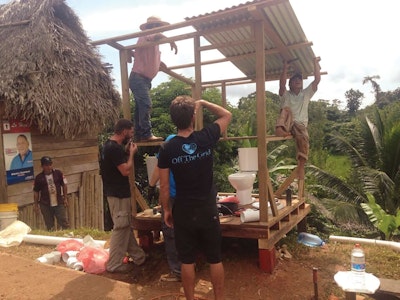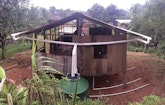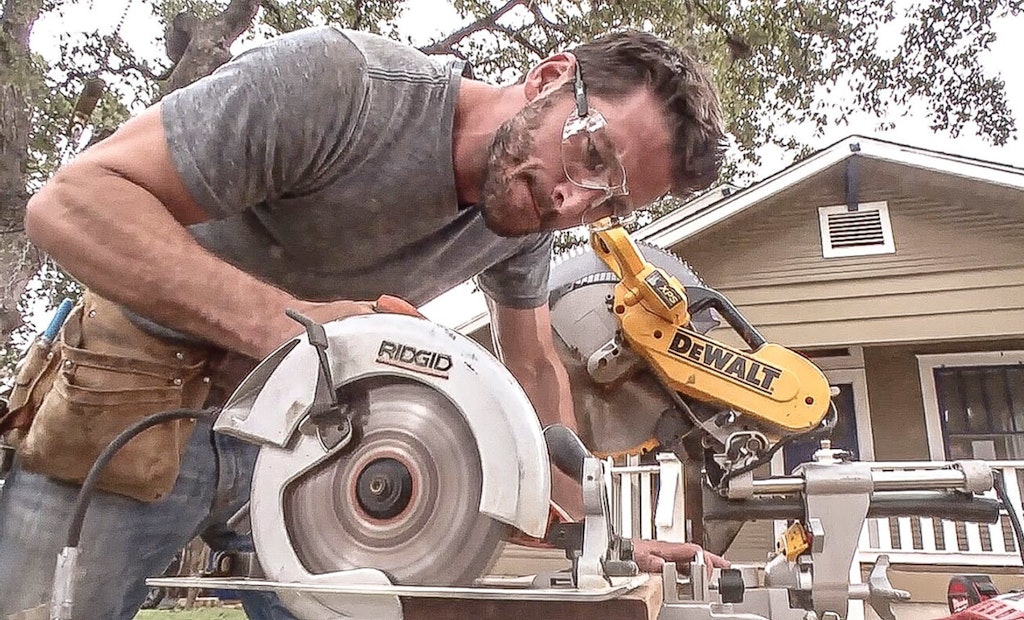It wasn’t too many years ago that Brett Tutor was apprenticing for his grandfather Chet Tutor’s home inspection company, a teenager hand-digging to uncover septic tank lids. Working in the hot Texas sun, he recalls jobs where he shoveled for hours through rock-hard soils and tree roots before hitting pay dirt.
One time, equipped only with a metal probe and a shovel, he was stymied trying to find the concrete tank in a yard with limestone pretty much everywhere 6 inches below the surface. “That probably took me six hours. That one was the worst. Everything I hit underground sounded like a tank, and I just couldn’t find it,” he recalls, leaving many test holes in his wake. “The yard looked like the gopher from Caddyshack got to it.”
Those days of digging are in the past — for now. Tutor still owns his own home inspection company, Property Doctors Home Inspections, in the greater Austin area. But he’s turned over the septic work to others for now as he takes on a new job as carpenter for the reboot of the popular home-remodeling show Trading Spaces.
A decade after the TLC network show went off the air, Tutor has taken over the hammer and power tools from star Ty Pennington, who remains on the show as one of its designers. The show blazed trails for the DIY remodeling craze when it ran from 2000 to 2008, spawning a wide variety of home improvement programming on several cable channels.
The premise is that two neighbors trade homes for two days, each using their own ideas to redecorate a room for the other, spending a maximum of $1,000 on the projects. With the return of the show, the homeowners can now spend $2,000 on the projects. With few materials and little time, Tutor has to make an interior designer’s vision become reality.
THE ROAD TO REALITY TV
So how did a guy with 2,000 septic inspections under his belt wind up starring in a reality TV show? Well, it’s an unconventional journey.
“It’s been a very odd chain of events. I was framing roofs and doing septic inspections in Austin when a girl I was dating at the time wanted to take an acting class. She wanted me to go along, and I didn’t want to go,” Tutor explains. He tagged along reluctantly but caught the eye of the teacher, who introduced him to someone that led to work as a stuntman. Then he found an agent and landed on the Discovery Channel survival show Treasure Quest. From there, he caught the attention of the producers of Trading Spaces.
“I didn’t even think to dream that big. I was a small-town Texas kid, and I wasn’t thinking of the entertainment business. I was busy trying to pay the rent and feed myself,” he recalls.
That blue-collar background makes him a refreshing choice to star in a home-remodeling show. Have you watched some of the programs on HGTV closely? The hosts appear to be plucked from a lineup of models and actors who have clearly never wielded a sledgehammer or held a circular saw in their lives.
My hunch was proven in a recent pre-Trading Spaces episode called Training Spaces, which introduces the new stars of the show. At one point, one of the other stars begged patience from the veterans on hand because she previously worked as a model. Then a show of hands revealed that almost everyone on the set started out as a model … except for Tutor.
This gives Tutor more than the typical authority on the issue of home repairs compared to most folks you’ll see in front of the camera. And people can tell.
FANS WANT TO TALK SEPTIC
While promoting his Trading Spaces debut this spring, Tutor found that crowds at home shows and other events gravitated toward talking about their septic systems. When asked, Tutor explains his background to fans of the show, and they start asking questions not about his carpentry skills, but about his onsite work.
“People just started telling me about their drainfield or ponding water in their backyards. Everybody just kind of perks up. It’s one of those topics where people don’t have education. It’s the topic of many conversations.”
When it comes to septic tanks, Tutor has heard all of the same stories you have over the years.
His most unusual inspection came when he located a septic tank beneath the in-ground pool at a multimillion-dollar estate. After consulting with a pumper friend, it was determined that the only way to correct the error was to rip up a $75,000 patio and deck and relocate a tank to a different part of the yard.
“I can’t tell you how many times I’ve heard that you don’t have to pump your septic tank. They say ‘I’ve never pumped it in 40 years and I’ve never had a problem.’ ‘Well you do now.’ Every time I hear that one, I just cringe,” he says. “And some people don’t even know they’re on septic.”
So he feels like he’s sharing valuable information with his inspection customers — but now he gets to reach a larger audience with the message.
“I enjoy the education part of it. I think that people need to be more educated on every system in their house, but especially their septic systems,” Tutor says. “When you think about the amount of money it costs to repair a clogged drainfield: if they just pumped out the tank every 2 to 5 years, it would prevent them from wasting all that money.”
Over a long period of performing three inspections per day, Tutor says so many home sales were killed because of malfunctioning and dangerous water and wastewater systems. Water-well tests often turned up contamination.
“We’d take the samples to the lab, and in one of four well inspections, we’d find coliform or E. coli, often caused by a septic system in the area that’s been poorly maintained for decades.”
CHARITY ONSITE WORK
Tutor is keeping a hand in the onsite industry through his inspection company back home; the work is now being performed by several independent contractors he hires. And he wants to learn more about the installing end of the industry through his nonprofit group Off The Grid International (www.otgi.org), which seeks to provide better sanitation to people in Third World counties. At the website, you can watch a video of Tutor and others installing a rudimentary septic system in Panama.
He wants to expand the work to serve poor people in remote areas and welcomes the help of experts in our industry to achieve better results. If you read this and are interested in helping with design challenges his group encounters, look him up on a variety of social media platforms or email him through his charity website.
Though his career has taken an unexpected turn into TV, Tutor remains excited about the onsite industry and is an advocate for young people to work in the trades. He sees great opportunity in the wastewater industry, and his optimism has rubbed off on his brother, Chase, who is now buying a vacuum truck and starting a pumping business.
“I’m not against anybody going to school and getting an education, but if people aren’t sure what they want to do, I say get into the trades. I would not be here if I didn’t do that,” Tutor says. He didn’t go to college, but Tutor found the skills he developed doing home inspections were in high demand and always allowed him to make a good living.
“I was doing septic inspections and making more money and having more freedom than my buddy with a master’s degree. If you don’t mind working hard, it’s a hell of an opportunity and it’s very valued,” he says. “There’s a huge need for tradespeople all over the country.”
BEST-KEPT SECRET
Working in the trades has given Tutor the flexibility to explore a TV career. He doesn’t have student loans to pay off, and he knows there’s always work waiting for him.
“I could go back if this doesn’t work out,” he says of the Trading Spaces gig. “Because I had a trade, that gave me the flexibility to swing for the fences with a few things. I couldn’t have done it had I been working for somebody else and locked in an office.”
Many young people would be envious of Tutor’s current career path. But he’s still excited to talk about the potential of the wastewater industry.
“I almost don’t want to tell anybody. It’s kind of a big secret in this country,” he says. “And when I hear young guys complaining about not having work, I want to scream because it’s out there.”










